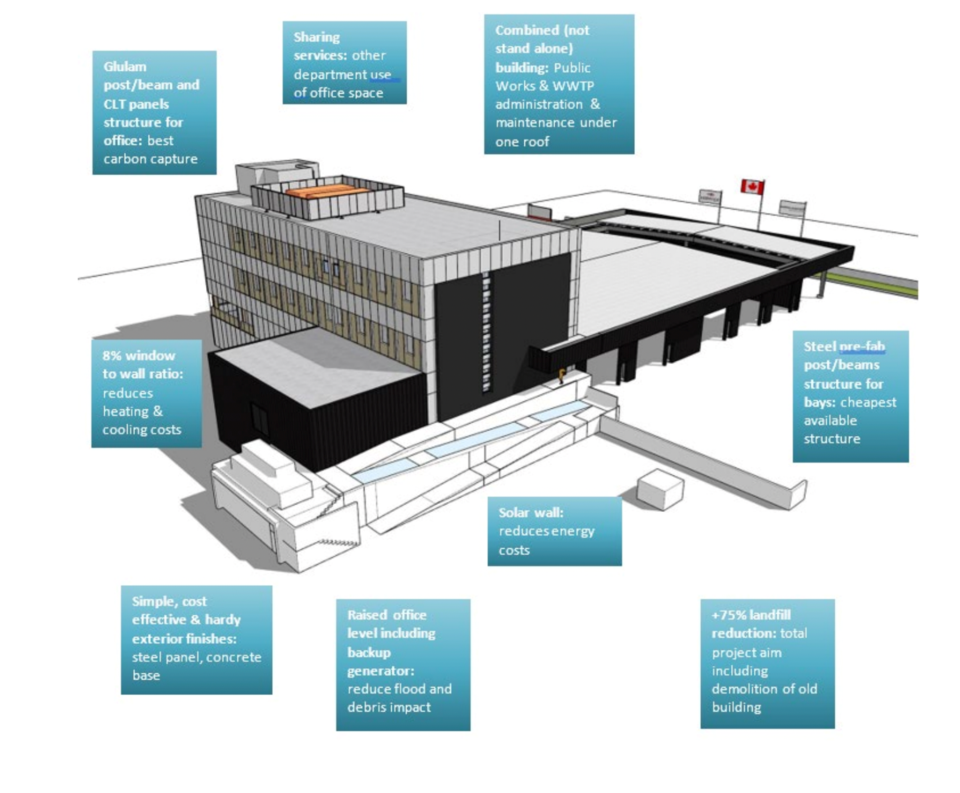The cost of Squamish's new public works facility has jumped to $37 million, up from its last estimate, which was $26.4 million. This represents an increase of about 40%.
This latest estimate was presented during council's meeting on Feb. 28.
During this meeting, elected officials voted unanimously in favour of continuing the project with this estimate. However, a final decision has yet to be made. Staff will bring forward an amended project budget with funding options in April. At that time, they will discuss an amendment to the 2023 budget.
, the municipality's director of facility planning and construction briefed politicians on the cost increases.
"This is across the board," said Kal Bragg. "Since the endorsement of the Real Estate Facilities Master Plan, project costs have significantly increased. This is specifically in labour material and transport … It's not just us; it's other municipalities that are having price escalation pressure."
The delay in last year's alternative approval process was also a factor in higher costs, he said.
To compensate for the uptick in the facility's price tag, the project team is considering what he called a simpler design.
"We're creating a building that is functional," said Bragg. "That's basic material and simple design and, by simple design, we mean it's a box. We reduce the amount of corners involved in there. We have a low window-to-wall ratio, which is at 8%."
He also added that the municipality has brought on a third party to verify the building costs.
"That's to check the numbers that we're getting from all our consultants and general contractor," said Bragg. "The quantity surveyor is also used throughout construction because they check the amount of work that's involved compared to what's been billed from the participants."
The project team also considered several options for cutting costs, but all of them had downsides that led staff to avoid recommending them.
These considerations were to remove the upper level of the building, leave the upper level unfinished, or reduce the overall office space.
Collectively, these could save close to $4.4 million, but they created other problems, such as the need for a complete redesign, and the inability of the building to adapt to future growth.
"Why staff are not recommending them is it doesn't future-proof the building," said CAO Linda Glenday. "And so we spend a lot of money on a building that very quickly becomes not functional."
Coun. Jenna Stoner wondered if there were equivalent cost escalations for Fire Hall No. 2, which is replacing the old Tantalus fire hall.
Bragg said that the prices for that project were locked in at an earlier time.
"It's also a different contract system and the way that we move through the pricing," he said.
Bragg also said that pausing the project now would not create any benefits.
"There'll be a lag in price increases if we stop the project — we'll also lose all the participants that we have sitting at the moment and we'll have to re-engage everyone," he said.
"There's no price savings; it will just stagnate. In fact, it'll cost more because the cost of re-engaging the participants at a later date is monumental on a project of this size. Because if you have a different architect or a different builder, they need to go back to Square 1, basically."
All on council supported moving forward with this current number and continuing discussions in April, when a final decision will be made.
"I feel that a lot of options were explored here and to come to this conclusion and to bring it forward to us," said Mayor Armand Hurford.
"What a wild time, as a community, to really take on the major projects that we have and make the commitment on this important piece of work to address the facilities deficit in our community.
He added that the escalation is partly the result of past decisions that put off this project when it was needed.
Coun. John French said the District should refrain from cutting costs on such an important endeavour.
"We cannot afford to cheap out on this," said French.
"I think back to when the first Alex Munro fire hall was built. Staff and council made a conscious decision at that time to erect a cheap building — a truly cheap building — that ultimately was not good value for money. It was a facility that quickly wasn't serving the needs of our community well, and it did not serve our community long-term. It was torn down and replaced by a far superior building."
He said it was necessary to learn from that experience.





